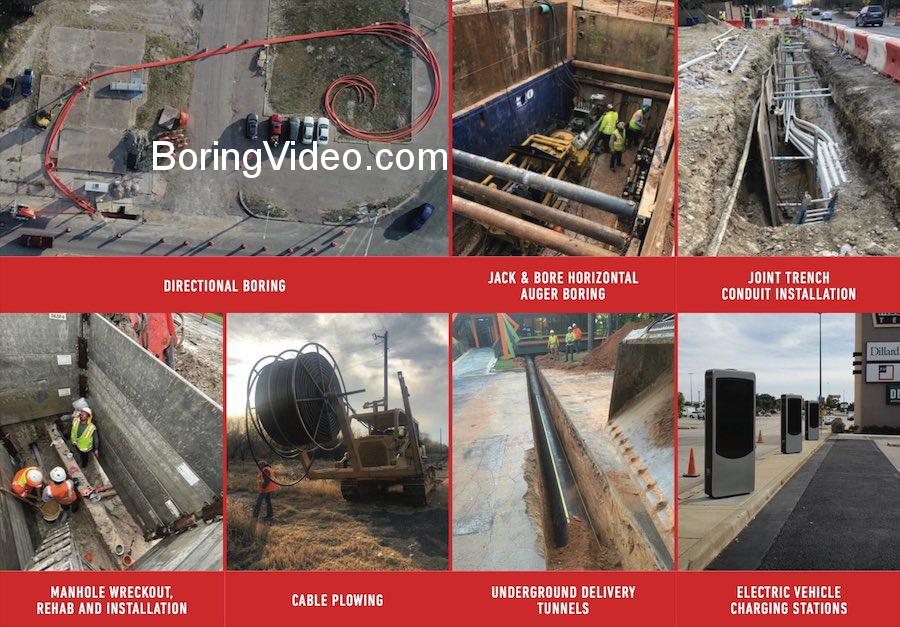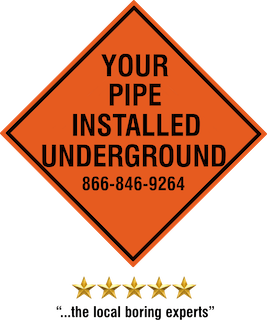Wastewater Boring
Boring Video - Wastewater Boring Contractors
Wastewater boring is a specialized technique within trenchless technology and boring methods that involves installing pipes, conduits, or other utilities for wastewater systems. It plays a critical role in various sectors and applications, including jack and bore, horizontal auger boring, oil & gas, sewer, drainage, stormwater, and more. Here’s a detailed breakdown of its utilization in these contexts:
Boring Video - Wastewater Boring Companies
1. Jack and Bore
- Purpose: Often used to install wastewater pipelines under obstacles like roads, railroads, and buildings.
- Process: A casing pipe is jacked into place while a rotating auger removes soil. This ensures precise alignment for on-grade (gravity flow) installations critical in wastewater systems.
- Advantages:
- Maintains proper % fall for gravity-driven wastewater flow.
- Reduces disruption to surface infrastructure.
2. Horizontal Auger Boring
- Purpose: Ideal for installing wastewater and stormwater lines in areas with sensitive surface conditions or high traffic.
- Process: Augers inside a casing remove soil while advancing the bore, maintaining alignment and grade.
- Applications:
- Used for stormwater drainage and sewer systems under roads and railroads.
3. Trenchless Technology
- Purpose: Avoids extensive excavation, preserving surface integrity in urban and sensitive environments.
- Relevance to Wastewater:
- Minimizes disruption to municipal and government properties.
- Cost-effective for long-distance sewer and drainage projects.
4. Oil & Gas
- Overlap with Wastewater: Wastewater boring techniques are often adapted in the oil & gas industry for environmental wastewater management, such as drilling wastewater pipelines for refineries or production sites.
5. Sewer Systems
- Critical Role:
- Wastewater boring ensures pipes are installed at precise grades for gravity flow.
- On-line and on-grade installations prevent clogs and backflow in sewer systems.
6. Drainage and Stormwater
- Functionality:
- Facilitates the installation of large-diameter drainage pipes under infrastructure.
- Ensures % fall requirements to handle water efficiently.
7. On-Line, On-Grade, and Gravity Applications
- Precision: Wastewater boring excels in maintaining alignment (on-line) and slope (on-grade), ensuring proper gravity-driven flow.
- Importance of % Fall: Exact grade measurements are critical, as improper slope can lead to blockages or inefficiency.
8. Roads and Railroads
- Application: Boring under highways, streets, or railroads ensures uninterrupted traffic and transportation during wastewater pipe installation.
- Advantage: Avoids surface disturbance and costly reconstruction.
9. Municipal and Government Projects
- Relevance:
- Used extensively in municipal infrastructure projects for sewer and drainage upgrades.
- Compliant with regulatory requirements for minimal environmental impact.
Boring Video - Wastewater Boring Near Me
Key Benefits of Wastewater Boring:
- Accuracy: Precision in alignment and grade ensures efficient wastewater flow.
- Non-Disruptive: Trenchless methods reduce environmental and surface damage.
- Cost Efficiency: Fewer surface repairs and quicker installation reduce overall costs.
- Sustainability: Minimizes excavation and environmental impact.
This combination of versatility, precision, and efficiency makes wastewater boring an indispensable tool across these industries.


